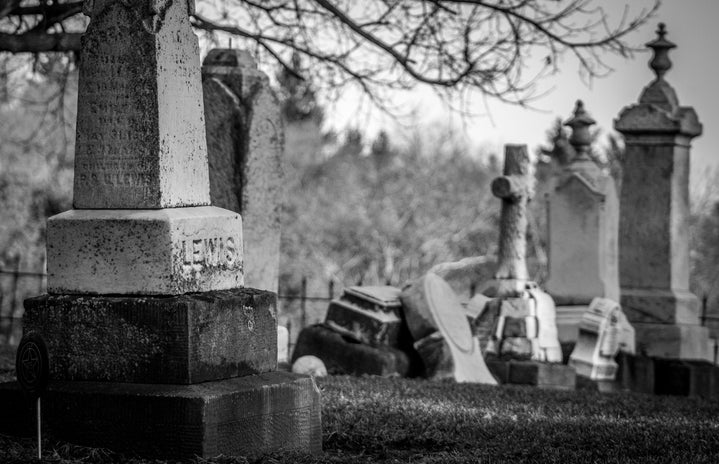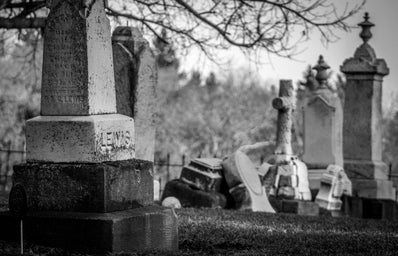This semester, we are both taking a course called “Death: Religion, Philosophy, and Law,” with Professor Nathaniel Berman. While the concept of “walking to Death” every Tuesday and Thursday at 10:30 seems very morbid, this class has been eye-opening and surprisingly uplifting throughout the first couple of weeks. It is heavily discussion-based, so Professor Berman solicits weekly discussion posts regarding everyone’s personal views on elements of life and death. We highly recommend this course for anyone looking to expand their minds, as well as those looking for a “fun” (and light workload) fourth class. Read below some of our personal thoughts on the past 3 weeks of content in this course!
Bea:
“And death shall have no dominion. / Dead men naked they shall be one” (Dylan Thomas)
Thomas’ poem And Death Shall Have No Dominion and these lines, in particular, reveal the universality of death. The reference to all dead men as “one” is indicative of the idea that once dead, we are all the same regardless of the life experience. To me, Thomas uses his poem to express this idea in order to demystify and almost simplify death for his readers. The mystery of death invokes fear in most; recognizing this fear, Thomas professes that death itself is inclusive. Additionally, Thomas’ intentional repetition of “death shall have no dominion” reveals that death’s power only exists in theory. Thomas rejects the idea that death is omnipotent–continuing to make death less frightening and more simplistic for his audience.
Maddie:
“The answers quick and keen, the honest look, the laughter, the love,—They are gone.”
This selection from Edna St. Vincent Millay from Dirge Without Music highlights the important dichotomy between death and memory. Here, the author implies that elements of personality that made the human special and memorable cease to exist after death. In my mind, it seems normal for someone to long for just one more “honest look” or to hear “the laughter” of a deceased loved one once again. However, I disagree with the contention that a person is “gone” when they die – as if death erases memory. Instead, I would like to believe that memory – and the beauty of it – can overpower the finality of death, and allow individuals, with all of their unique characteristics and experiences while alive, to live on after their eventual end.
Bea:
“Men fear that when it’s been separated from the body, it may no longer exist anywhere, but on the very day a man dies, it may be destroyed and perish” (15) – Plato
The “it” referred to in this excerpt from Plato’s Phaedo represents the human “soul.” Plato focuses on the separation of the soul from the body during death in his discourse. In the above quote, Plato makes an important observation about why death invokes such distinct and even crippling fear in the human race. He touches on the idea that when a person passes, they (or their soul) ceases to exist–almost as if this person never occupied space on earth. However, as we discussed in last week’s classes, memories help soften the finality of death for those grieving the passing of a loved one. An individual’s soul does not “perish” immediately upon death because our souls live on past our biological deaths.
Maddie:
“No one knows whether death may not be the greatest of blessings for a man, yet men fear it as if they knew it is the greatest of evils.”
This selection from “Death in Socrates, Plato, and Aristotle” by Gareth B. Matthews highlights Socrates’s perspective on death, wisdom, and ignorance. Here, Socrates offers guidance and an attempt at solace to those who fear an unknown afterlife. To me, this quotation exemplifies the near-universal anxiety we feel toward the end of our lives. From Socrates’s offering to Hamlet’s mention of the “undiscovered country,” death scares everyone. Socrates attempts to explain, though, that this fear is not necessarily because the thought of ending life seems so grim, but because the lack of knowledge and subsequent fear of what comes next is haunting to everyone on earth.
Bea:
“Death and postponement are irreconcilable and they are mortal enemies, but the earnest person knows that death is stronger” (80) – Kierkegaard
Although the above quote from Kierkegaard’s essay, At a Graveside, struck me as insightful, I also disagree with aspects of Kierkegaard’s overall argument. Kierkegaard uses the word “postponement” to reference the entirety of an individual’s life. His use of the word postponement leaves me feeling unsettled. I understand that our lives inevitably end with death, but referring to life as a postponement of death disregards just how colorful, rich, and important our lives are. Kierkegaard minimizes life to one big stalling mechanism. His cynicism makes death too powerful–placing it on a daunting pedestal. Yes, death holds a great deal of strength, perhaps more than life, but the act of living requires an enormous amount of strength, power, and grit. I agree that life and death juxtapose each other. However, I believe we should celebrate life and its power in tandem with the recognition of death and its ever-looming presence.
Maddie:
“Death in earnest gives life force as nothing else does; it makes one alert as nothing else does.”
This selection from Kierkegaard’s “At a Graveside” stood out to me as an important universal truth. While this course primarily focuses on death (as the name suggests), it has been personally eye-opening to think about the concept in terms of its opposite: life. Kierkegaard frames this binary opposition succinctly in the quotation above. To me, we fear death because it signals the bitter and irreversible end to life, not necessarily because something so terrible is waiting for us on the other side. It seems plausible that, even to those who suffer tremendously while on earth, death’s finality makes life seem all the more beautiful of an experience, one that every individual is eager to hold onto for eternity. Given these opposing forces, Kierkegaard suggests that if men look upon death with fear, then they should be consistently and joyously celebrating life while it still belongs to them.



